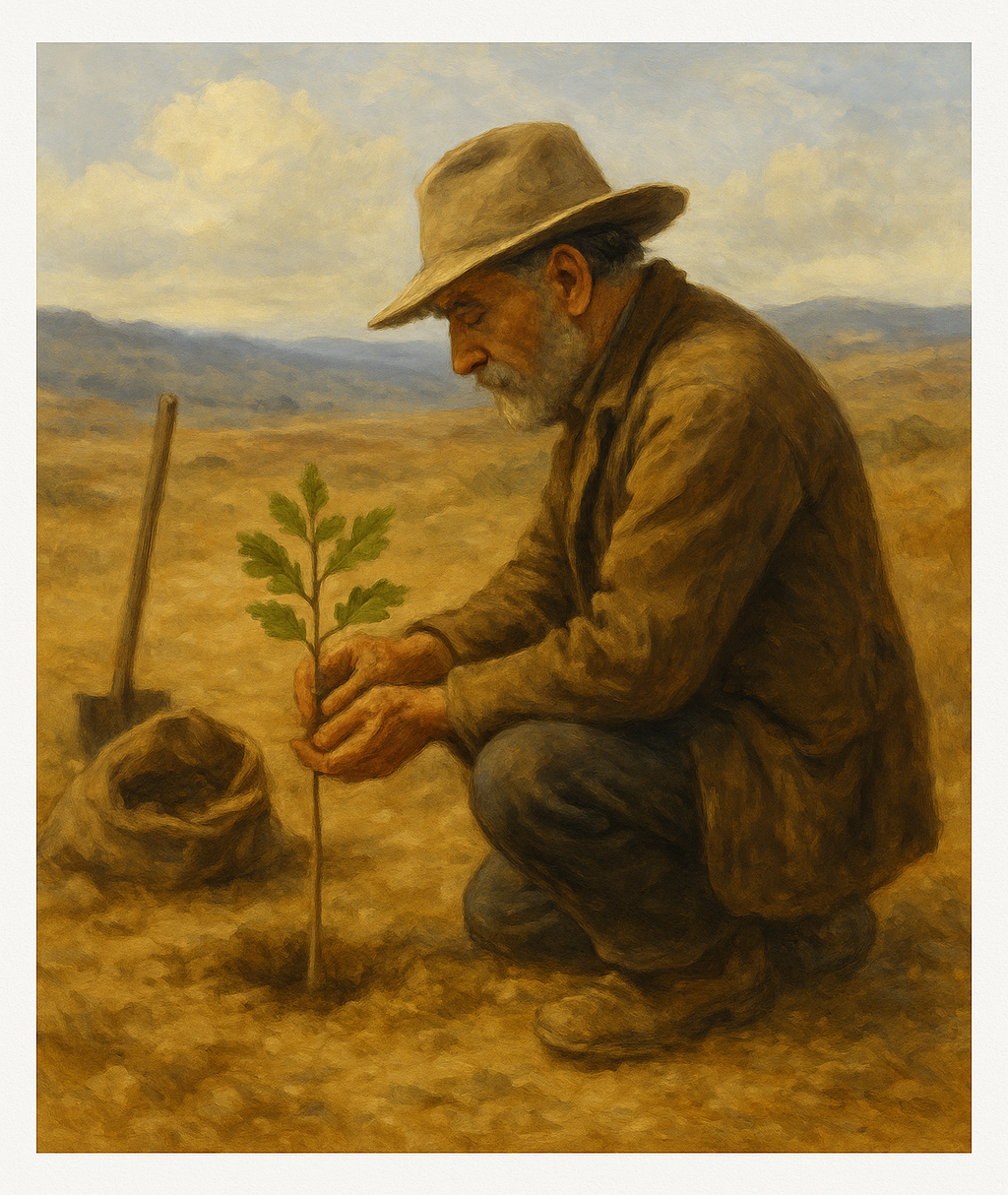The Work in Front of Us

How small choices and steady effort shape change over time
I first read the story years ago, on a flight home from a client engagement on organizational change. I had picked up the book at a Hudson News without much thought, the way you reach for something small when you are too tired to make a deliberate choice.
The Man Who Planted Trees opens in a place that feels precarious. A man walks across a stretch of land in southern France worn down by drought. Villages are fading, their wells unreliable, their fields failing. Nothing in that landscape suggests renewal. Yet he kneels in the dry soil and plants acorns, one after another, without any promise that they will take root or that the land will ever look different. It is quiet work, almost invisible, the kind we tend to overlook until much later.
Something in the story pulled me in. Maybe it was the repetition and the uncertainty, the slow work of someone moving toward a future they couldn’t yet see. It felt familiar. I kept reading, not for meaning exactly, but because the rhythm on the page echoed the work I knew.
What struck me most was how little he seemed to expect from his own efforts. He planted because planting was the work in front of him, not because he had any guarantee the hillside would change. There was discipline in that choice, a willingness to act without knowing the outcome, to make small, deliberate decisions and trust that repetition might matter over time. It was a form of patient experimentation, a steady refusal to stop simply because the results were slow to appear.
The first stages of any meaningful change rarely feel decisive. More often they feel uneven and provisional, a mix of small choices made before there is any proof they will add up to something coherent. You revise a process. You rethink an assumption. You adjust the way a task is done, knowing it may need to be adjusted again. None of it looks transformative in the moment. It is slow, often tedious, and easy to doubt. But over time, those small decisions begin to shape the direction of the work.
In shared efforts, these early shifts are even harder to see. People move at different speeds. They try something, revise it, try again. Someone tests a new approach. Someone else lets go of an old habit. None of it looks meaningful at the time. From within, it can feel scattered, as if the work lacks direction. But small steps begin to settle into place. They create a momentum that only becomes clear in hindsight, when we notice the work has turned into something none of us could have built alone.
Leading through these early stages also means building a plan and sharing a vision, even when the details are still taking shape. Someone has to offer a direction the work can move toward, a sense of how the pieces might eventually fit together. That doesn’t eliminate uncertainty, but it gives people something to hold on to while the early steps accumulate. The progress can be uneven and the signals unclear, yet part of the work is staying steady through that ambiguity and trusting that patient, deliberate effort will begin to reveal the shape of what comes next.
I listen to the story on an audiobook now. It’s become meditation. It reminds me that meaningful change rarely announces itself. It shows up slowly, in the accumulation of small decisions and steady effort, long before the outcome is visible. You do the work available to you, make the next choice, then the one after that. Most of it feels ordinary, and sometimes uncertain, yet the pattern reveals itself, one action at a time. The main character in the story understood this in his own way. He committed to work long before there was any reason to believe the land would change.
What stays with me is how small actions matter over time. I think about that when the work of transformation feels slow or the next step is not obvious. The experiments, the conversations, the steady communication about what works and what doesn’t, all of it adds up. In the end, the land changes because someone keeps showing up to do the work.
